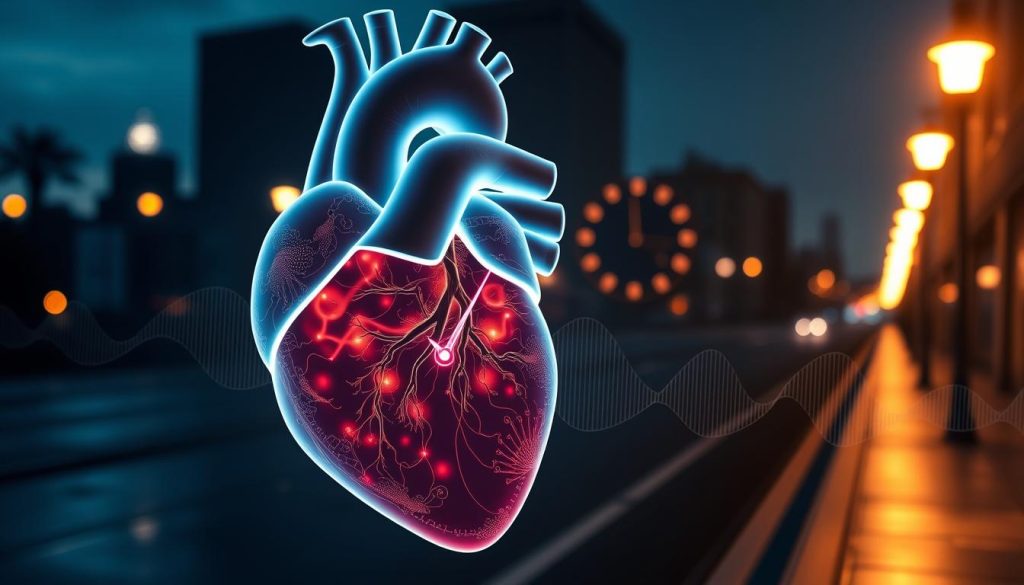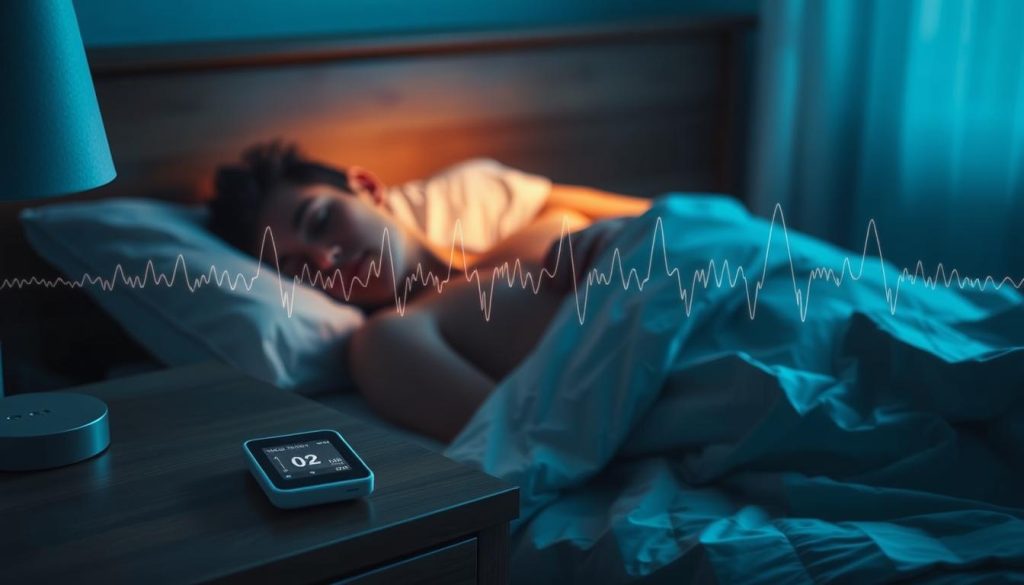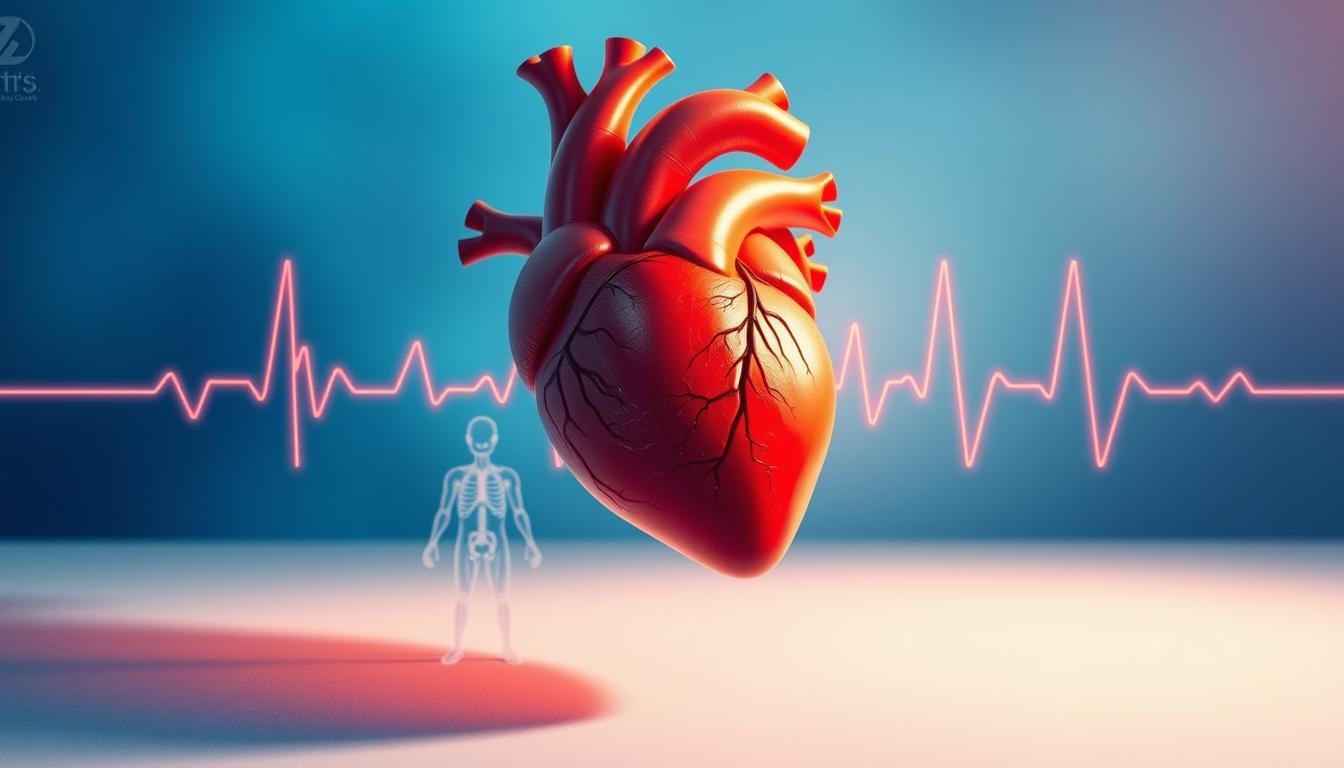Your heart doesn’t just beat to its own drum. It actually follows a complex internal schedule that affects when you’re most at risk for cardiac events.
Recent studies show a strong link between our body’s natural timing systems and cardiac wellness. The connection between circadian rhythm and cardiovascular disease reveals something surprising. When you sleep, eat, and exercise can be just as important as what you actually do.
Think about it this way: your body runs on an internal clock that controls everything from hormone release to blood pressure changes. This biological timing system doesn’t just help you feel alert during the day. It also protects your heart by managing when certain processes happen.
Understanding this connection opens up new ways to protect your heart health. Simple changes to your daily schedule might reduce your risk of heart problems. The timing of your activities could be your heart’s best friend.
Understanding Circadian Rhythm
Nature gave humans biological clocks to manage sleep, energy, and health. These clocks have evolved over millions of years. They help us survive and thrive in a day-night world. Knowing how they work is key to keeping our hearts healthy.
Your body doesn’t choose when to be tired or awake randomly. It follows a 24-hour cycle. This cycle affects hormone levels and body temperature all day.

What is Circadian Rhythm?
Circadian rhythm is your body’s 24-hour clock. It tells you when to sleep, wake, and do other biological tasks. The word “circadian” means “about a day” in Latin. This clock works even in complete darkness or isolation.
Think of circadian rhythm as your personal conductor. Just as a conductor leads an orchestra, your biological clocks coordinate body systems. These systems work together for better health and performance.
Chronobiology studies these time-based processes. Scientists have found that nearly every cell in your body has its own molecular clock. These clocks sync up with your master clock for coordinated rhythms.
Here are the key functions your circadian rhythm controls:
- Sleep and wake cycles
- Hormone production and release
- Body temperature fluctuations
- Blood pressure variations
- Digestive processes and metabolism
How Circadian Rhythms Work in the Body
Your master biological clock is in a tiny brain area called the suprachiasmatic nucleus. This area acts as a central command center. It receives light signals from your eyes and sends timing messages to your body.
When morning light hits your eyes, your master clock starts a hormonal change. Cortisol levels rise to make you alert and energized. Melatonin production stops, making you feel awake. Your body temperature starts to rise from its nighttime low.
As evening comes, the process reverses. Reduced light signals your brain to start melatonin production. This hormone makes you feel sleepy and prepares your body for rest. Your heart rate slows, blood pressure drops, and body temperature decreases.
Chronobiology research shows these rhythms affect more than sleep. Your cardiovascular system also has daily patterns. Blood pressure peaks in the morning and dips at night. Heart attacks and strokes often happen in the morning when these systems are most active.
The timing of these biological processes is crucial. When your internal clocks work right, they protect your heart and blood vessels. But when they’re disrupted, your cardiovascular health can suffer a lot.
The Link Between Circadian Rhythm and Cardiovascular Health
Your heart and circadian rhythms are closely linked. Your heart doesn’t just pump blood; it follows a schedule that affects blood pressure and heart rate. When your sleep patterns change, your heart feels it right away.
Studies show that heart disease risk goes up when our natural rhythms get out of sync. Your body expects certain things to happen at specific times, and your heart is no exception.

Importance of Biological Clocks
Every cell in your heart has its own molecular clock. These clocks help coordinate your heart’s function with your body’s daily cycle. They regulate heart rate, blood vessel constriction, and hormone release.
When you sleep well, your heart rate slows down at night. This lets your cardiovascular system rest and repair. Without this rest, your heart works too hard, leading to wear and tear.
Your heart’s biological clocks also control blood clotting and inflammation. When they work right, they protect against heart attacks and strokes. They coordinate these processes with your daily activities.
How Disruption Affects Heart Health
Disrupted circadian rhythms harm blood pressure regulation first. People with irregular sleep often lose the nocturnal dipping effect. This means their blood pressure stays high at night, straining blood vessels and increasing heart disease risk.
Shift workers face high cardiovascular risks because their bodies never adjust to night work. They have 40% higher heart disease rates than those with regular daytime schedules. Their bodies try to follow natural rhythms but are forced into artificial ones.
Disrupted circadian rhythms also cause chronic inflammation in blood vessels. This inflammation damages artery walls and leads to plaque buildup. It also affects glucose and insulin processing, adding to cardiovascular stress.
Heart attacks and strokes often happen in the early morning. This is when circadian rhythms naturally cause blood pressure and heart rate to rise. When these rhythms are disrupted, this surge can happen at any time, raising overall risk.
Factors Disrupting Circadian Rhythms
Many things in our daily lives can mess up our natural sleep cycles. These issues don’t just make us tired. They also pose serious heart risks that many people overlook.
Knowing what harms our natural rhythms helps us make better choices. Let’s look at the main things that mess with our body’s internal clock.
Modern Lifestyle Impacts
Our society that never sleeps works against our natural rhythms in many ways. Artificial lighting keeps us awake long after the sun goes down. This confuses our brain’s signals for sleep.
Screen time before bed is a big disruptor. The blue light from phones, tablets, and TVs tricks our brain into thinking it’s still daytime. This delays melatonin production and pushes back our natural bedtime.
Irregular meal times also mess with our internal clocks. Eating late dinners or skipping breakfast sends mixed signals to our body. Our digestive system needs to sync with our sleep-wake cycle.
Jet lag is a perfect example of rhythm disruption. When we travel across time zones, our internal clock stays on home time while our environment changes. This mismatch causes fatigue, poor concentration, and temporary heart rhythm changes.

Constant connectivity adds another layer of stress. We check emails at midnight and respond to messages during what should be wind-down time. This mental stimulation keeps our nervous system activated when it should be preparing for rest.
Shift Work and Its Consequences
Millions of Americans work non-traditional hours that go against their natural rhythms. Nurses, security guards, factory workers, and emergency responders sacrifice their biological clocks to keep society running.
Shift work creates unique cardiovascular challenges. Workers often experience shift work disorder, which goes far beyond feeling tired. Research shows these individuals face 40% higher rates of heart disease compared to day workers.
The cardiovascular risks from shift work include several serious conditions:
- Increased blood pressure during unusual hours
- Higher risk of heart attacks, especially during night shifts
- Elevated stress hormone levels that damage blood vessels
- Irregular heart rhythms from disrupted sleep patterns
Night shift workers often struggle with poor sleep quality during daylight hours. Their bodies fight against sleeping when natural light signals wakefulness. This creates chronic sleep debt that compounds cardiovascular stress.
Rotating shifts present even greater challenges. Just as workers adapt to one schedule, they must switch to another. This constant adjustment prevents their circadian rhythms from ever stabilizing properly.
Sleep Disorders and Heart Disease
Sleep disorders and heart problems create a dangerous cycle that feeds on itself. Poor sleep leads to cardiovascular issues, which then make quality sleep even harder to achieve.
Sleep apnea represents one of the most serious rhythm-related heart risks. This condition causes repeated breathing interruptions during sleep. Each episode stresses the cardiovascular system and disrupts natural sleep cycles.
People with sleep apnea experience oxygen drops that trigger fight-or-flight responses. Their heart rate and blood pressure spike multiple times per night. Over time, this leads to permanent cardiovascular damage.
Insomnia creates its own set of heart problems. Chronic sleep loss increases inflammation throughout the body. This inflammatory response damages blood vessels and increases the risk of heart attacks and strokes.
Restless leg syndrome disrupts sleep quality even when people get enough hours in bed. The constant movement and awakenings prevent deep, restorative sleep phases. This leaves the cardiovascular system without proper recovery time.
These sleep disorders often worsen existing heart conditions. People with heart disease may develop sleep problems as a side effect of their condition. This creates a cycle where each problem makes the other worse.
The good news is that treating sleep disorders often improves heart health. When people address their sleep problems, they frequently see improvements in blood pressure, heart rhythm, and overall cardiovascular function.
The Role of Sleep in Cardiovascular Health
Your heart needs sleep to stay healthy. During sleep, your heart and blood system repair themselves. This helps control blood pressure and inflammation.
Sleep is like medicine for your heart. Good sleep fixes damaged blood vessels and lowers heart stress. But, bad sleep can harm your heart.
Sleep Quality vs. Sleep Quantity
Getting eight hours of sleep is important, but quality matters too. Deep sleep is best for your heart. Shallow sleep can stress your heart, even if you sleep long.
Heart rate variability shows how well you sleep and how healthy your heart is. It measures the time between heartbeats. Better heart rate variability means better sleep and heart health.

Sleep disorders are bad for your heart. Sleep apnea, for example, cuts off oxygen and makes your heart work harder. It’s common and increases heart disease risk.
People with sleep disorders are at higher risk for heart problems. Their sleep is broken, which stops their heart from resting and staying healthy.
Best Practices for Better Sleep
Make your bedroom sleep-friendly. Keep it cool, dark, and quiet. The best temperature is 65-68 degrees Fahrenheit.
Have a bedtime routine to signal sleep time. Dim lights, avoid screens, and relax before bed. This helps your body get ready for sleep.
Choose the right sleep position and mattress. Back or side sleeping is better than stomach. A good mattress supports your spine and helps you sleep better.
If you think you have a sleep disorder, get checked out. Early treatment can stop serious heart problems and improve your health.
Lifestyle Changes to Support Circadian Rhythms
Your daily habits are key to keeping your heart healthy. Simple changes in eating, exercise, and daily routines can greatly help. These changes are easy to make and can make a big difference.
These lifestyle changes work with your body’s natural rhythms. They are simple and effective when done regularly.
Nutrition and Timing
When you eat is as important as what you eat for heart health. Your body’s digestive system works best during the day. Eating big meals then helps your body use nutrients better.
Eating late can mess with your body’s rhythm. It can raise blood pressure and cause heart problems. Try to eat your last meal three hours before bed.
Time-restricted eating helps keep your body’s rhythm in check. It’s not about cutting calories but following your natural rhythm. Many people eat from 7 AM to 7 PM, allowing for a natural fast at night.
Regular meal times help your internal clock. Eat breakfast, lunch, and dinner at the same times each day. This makes digestion easier and reduces heart stress.
Exercise and Daily Routines
Morning exercise is great for your heart and rhythm. It helps set your body’s clock and boosts heart health all day. Even a short walk in the morning can help.
Don’t do intense workouts close to bedtime. They can raise your heart rate and body temperature when you should be relaxing. If you exercise at night, choose something gentle like yoga.
Keep your daily routines consistent. Wake up and go to bed at the same time every day. Get bright light in the morning and dim it at night.
Small daily habits help keep your rhythm stable. This could be having coffee at the same time, taking a walk in the afternoon, or starting your evening routine at a set time. These habits help your heart stay healthy.
Research Insights on Circadian Rhythm and Heart Disease
Recent studies are changing how we see the link between biological clocks and heart health. Scientists around the world are finding new connections that could change how we treat heart disease. They show how timing is key in both causing and treating heart issues.
Recent Studies and Findings
A major study in the European Heart Journal followed over 88,000 people for seven years. It found that those with irregular sleep had a 22% higher risk of heart disease.
Shift workers are especially at risk. Studies show they might have heart disease rates up to 40% higher than day workers. Their irregular sleep patterns lead to changes in metabolism that harm the heart.
Research on when heart attacks happen is interesting. Heart attacks mostly happen between 6 AM and noon. This matches when blood pressure, heart rate, and stress hormones naturally peak.
Chronotherapy is exploring new ways to treat heart disease. It shows that timing medications can make them up to 50% more effective. For example, blood pressure meds work better at bedtime, and some heart meds are best in the morning.
Implications for Public Health
Healthcare is starting to use circadian science in patient care. Hospitals plan surgeries during the best times to lower risks. Emergency rooms also adjust staff schedules to match when heart issues happen.
Workplaces are changing their policies too. Some companies avoid night shifts and use better lighting. These steps help keep employees healthy while keeping them productive.
Public health officials see big changes needed. Our always-on economy might be causing more heart disease. Sleep education is now part of health care everywhere.
Future studies will focus on treating each person based on their own circadian rhythm. This could make treatments more effective and reduce side effects. It’s a step towards personalized medicine for heart health.
Tips for Maintaining a Healthy Circadian Rhythm
Controlling your circadian rhythm is easier than you think. Small daily changes can greatly improve your heart health and overall well-being. These tips will help you align with your body’s natural rhythm.
Setting a Consistent Sleep Schedule
Your body loves routine. Going to bed and waking up at the same time every day is key. Even on weekends, try to stay close to your regular schedule.
If you need to adjust your bedtime, do it slowly. Start by changing it by 15-30 minutes each night. This helps your internal clock adjust without stressing your heart.
Reducing Screen Time Before Bed
Blue light from screens can confuse your brain, making it think it’s still daytime. This messes with your sleep patterns. Make your bedroom a tech-free zone and avoid screens for at least an hour before bed.
Instead, try reading, gentle stretching, or listening to calming music. These activities help your body relax and prepare for sleep.
Promoting Natural Light Exposure
Light is crucial for your circadian rhythm. Get bright morning sunlight within an hour of waking up. This tells your body it’s time to start the day.
In the evening, dim the lights to signal it’s time to sleep. If you work indoors, take short breaks outside during the day. This helps keep your rhythm healthy.

